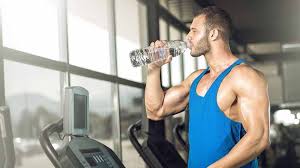When it comes to fitness and wellness, many people focus on workout routines, diet plans, and supplements. However, one of the most essential—and often overlooked—components of overall health is hydration. Water plays a vital role in nearly every bodily function, and staying hydrated is especially crucial for those leading an active lifestyle.
In this article, we’ll explore why hydration is so important in fitness, how it affects performance, signs of dehydration, and how much water you truly need to support your health and fitness goals.
Why Hydration Matters in Fitness
Water is more than just a thirst quencher. It regulates your body temperature, supports joint function, transports nutrients, and removes waste. During physical activity, your body loses water through sweat and respiration. If you don’t replenish this loss, your body becomes dehydrated, leading to fatigue, cramps, dizziness, and decreased performance.
Here are some key functions of water in fitness:
1. Regulates Body Temperature
During exercise, your internal body temperature rises. Sweating is your body’s natural way to cool down. But if you’re dehydrated, you sweat less efficiently, which can lead to overheating.
2. Lubricates Joints and Muscles
Water keeps your joints cushioned and flexible. It also helps prevent muscle cramps and strains by maintaining electrolyte balance.
3. Improves Endurance and Strength
Dehydration can cause early fatigue, reduce strength output, and slow reaction time. Staying hydrated keeps your energy levels high and supports better endurance.
4. Aids Nutrient Transport and Recovery
Water transports essential nutrients to your muscles and organs. Post-workout, it helps flush out toxins and supports muscle recovery.
Signs of Dehydration
Recognizing early signs of dehydration is key to preventing poor performance or health issues. Some common symptoms include:
- Dry mouth
- Fatigue or weakness
- Dizziness or lightheadedness
- Headache
- Dark yellow urine
- Muscle cramps
- Faster-than-normal heartbeat
Severe dehydration can lead to heat exhaustion or heat stroke, both of which require immediate medical attention.
How Much Water Do You Really Need?
The amount of water a person needs varies depending on factors like body weight, activity level, environment, and individual health. The general rule is:
8-10 glasses (2-2.5 liters) per day for an average adult.
However, active individuals or athletes require more due to the loss of fluids through sweat.
Water Intake Guidelines for Active People
- Before Exercise:
Drink 400–600 ml (14–20 oz) of water 2–3 hours before workout. - During Exercise:
Sip 150–250 ml (5–8 oz) every 15–20 minutes, especially during intense or long sessions. - After Exercise:
Rehydrate by drinking 500–750 ml (16–24 oz) of water for every pound (0.5 kg) lost through sweat.
Weighing yourself before and after a workout can help determine how much fluid you’ve lost.
Do You Need Electrolytes Too?
Electrolytes such as sodium, potassium, magnesium, and calcium help regulate fluid balance, nerve signals, and muscle contractions. During intense exercise (especially in hot environments), these are lost through sweat.
You may benefit from electrolyte drinks if:
- You’re working out for longer than 60 minutes
- You’re in a hot or humid environment
- You sweat heavily
- You experience frequent cramps
Natural sources like coconut water, bananas, or a pinch of salt in water can help maintain electrolyte balance.
Tips to Stay Hydrated Throughout the Day
- Start Your Day with Water
Drink a glass of water first thing in the morning to kickstart hydration. - Carry a Water Bottle
Having water on hand makes it easier to sip regularly throughout the day. - Flavor Your Water
If plain water feels boring, add slices of lemon, cucumber, or berries for a refreshing taste. - Eat Water-Rich Foods
Include fruits and vegetables like watermelon, cucumber, lettuce, and oranges in your meals. - Set Reminders
Use phone alarms or hydration apps to remind you to drink water regularly. - Hydrate Before You’re Thirsty
Thirst is a sign that your body is already mildly dehydrated. Drink consistently rather than waiting.
Hydration Myths Debunked
Myth 1: You only need water when you’re thirsty
Fact: Thirst is not always a reliable indicator. You can be dehydrated without feeling thirsty.
Myth 2: More water is always better
Fact: Overhydration or water intoxication can occur if you drink excessive amounts without balancing electrolytes.
Myth 3: Coffee and tea don’t count
Fact: Though they are diuretics, moderate consumption of tea or coffee still contributes to hydration.
Personalized Hydration: One Size Doesn’t Fit All
Everyone’s hydration needs are different. Some factors to consider include:
- Body Size: Larger individuals generally need more water.
- Climate: Hot or humid weather increases fluid loss.
- Activity Level: The more you sweat, the more water you need.
- Health Conditions: Illness, medications, and chronic conditions like diabetes can affect hydration.
Listening to your body, monitoring your urine color (aim for pale yellow), and adjusting intake as needed are the best ways to stay properly hydrated.
Final Thoughts
Hydration is the foundation of fitness success. Without enough water, your body can’t perform at its best, recover effectively, or maintain long-term health. Whether you’re lifting weights, running, or doing yoga, make hydration a non-negotiable part of your routine.
Start each day with water, fuel your workouts with fluids, and stay ahead of thirst. It’s a simple step that can make a huge difference in how you feel and perform. Your body will thank you—not just during workouts, but every day.

